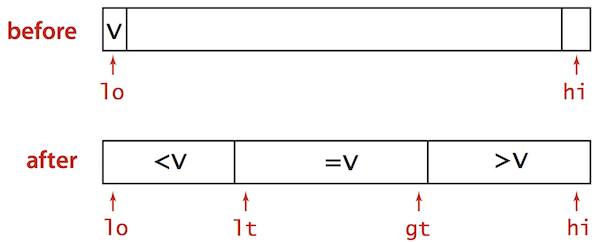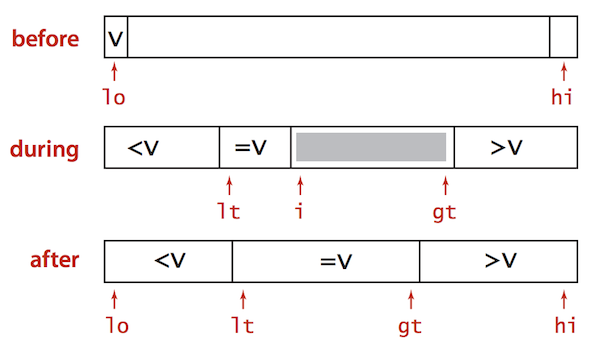Nothing special here. It’s just a blog post for summarising my algorithm learning course. Although this was already taught in the University, I remember nothing about it because I haven’t touched it for the long time.
- Part 1 - Basic Implementation
- Part 2 - Selection Problems
- Part 3 - 3-way Partitioning
Quick Sort - Duplicate Keys Problem
- Quick Sort goes quadratic unless partitioning stops on equal keys!
- ~½N2 compares when all keys equal.
- B A A B A B B B C C C
- A A A A A A A A A A A
- Solve by using 3-way partitioning
3-way Partitioning
Partition array into 3 parts so that:
- Entries between lt and gt equal to partition item v
- No larger entries to left of lt
- No smaller entries to right of gt

- Let
vbe partitioning itema[lo] - Scan
ifrom left to right.(a[i] < v): exchangea[lt]witha[i]; increment bothltandi(a[i] > v): exchangea[gt]witha[i]; decrementgt(a[i] == v): incrementi
Java Implementation
private static void sort(Comparable[] a, int lo, int hi) {
if (hi <= lo) return;
int lt = lo, gt = hi;
Comparable v = a[lo];
int i = lo;
while (i <= gt)
{
int cmp = a[i].compareTo(v);
if (cmp < 0) exch(a, lt++, i++);
else if (cmp > 0) exch(a, i, gt--);
else i++;
}
sort(a, lo, lt - 1);
sort(a, gt + 1, hi);
}

Quick Sort with 3-way partitioning is even shorter (and harder to imagine). I gave one compliment to the brain that could thought of those above solutions.
